A Report on 2023 - Annual London Global Convention

The Institute of Directors (IOD), India, organised its 2023 annual London Global Convention on 'Corporate Governance and Sustainability' in London on October 17–20, 2023. The convention was inaugurated with the traditional lighting of the lamp, followed by deliberations in Hotel The Montcalm, Marble Arch, London, on October 17 and 18. The Global Business Meet was held on October 19 at the House of Lords, UK. The last day was marked for a Special Session on the theme, “Great Boards for Economic Growth and Resilience”, which was held at Regent Street Cinema on October 20, 2023.
The theme of this year's Annual Convention was 'Board's Tryst with ESG and Making Corporate Governance Work in the New World Economy'. The famed Golden Peacock Awards instituted by the Institute of Directors, India, in 2001 for 'Corporate Governance', 'Sustainability' (both National and Global), 'Risk Management', and 'ESG' were also presented to the winners amongst business and industry at the 'Golden Peacock Awards Nite Ceremony' on October 17. All the national and global winners who had won the Awards collected the same in person from the Chief Guest. The List of such Winners is contained elsewhere in this issue.
The 2023 London Global Convention that witnessed a record attendance was attended by eminent experts, prominent industrialists, & well-known speakers from India and around the world. Delegates from as many as 19 countries attended the event, including the USA, UK, UAE, France, Germany, Singapore, Netherlands, Poland, Finland, Ireland, South Africa, Angola, Sri Lanka, Bermuda, Oman, Zimbabwe, Myanmar, Nepal, and Maldives, besides India. A large number of prominent members of the Indian diaspora in U.K. were present and participated in the Global Business Meet.


Inaugural Session
The Inaugural Session commenced with the customary lighting of the lamp of knowledge. It was explained to the global audience, especially the foreign delegates, that in Indian tradition, the lamp symbolizes the 'Lamp of Light' that spreads learning and knowledge. On behalf of IOD, the Nobel Prize Winner, Rabindranath Tagore, the first Indian to be so honoured was introduced to the audience, saying, “Don't ever curse the darkness; instead, light a lamp to dispel it'.
Lt. Gen. Surinder Nath, PVSM, AVSM (Retd.), President, Institute of Directors, India, introduced the London Global Convention and welcomed all the guests. He said that boards must focus on creating inclusivity, sustainable and resilient global value chains, supporting developing countries to move up the value chain, facilitating investments towards sustainable business models, devising pipelines of investible projects in developing countries, promoting ease, and reducing the cost of doing business. He also outlined the similarities and differences between ESG and Sustainability.
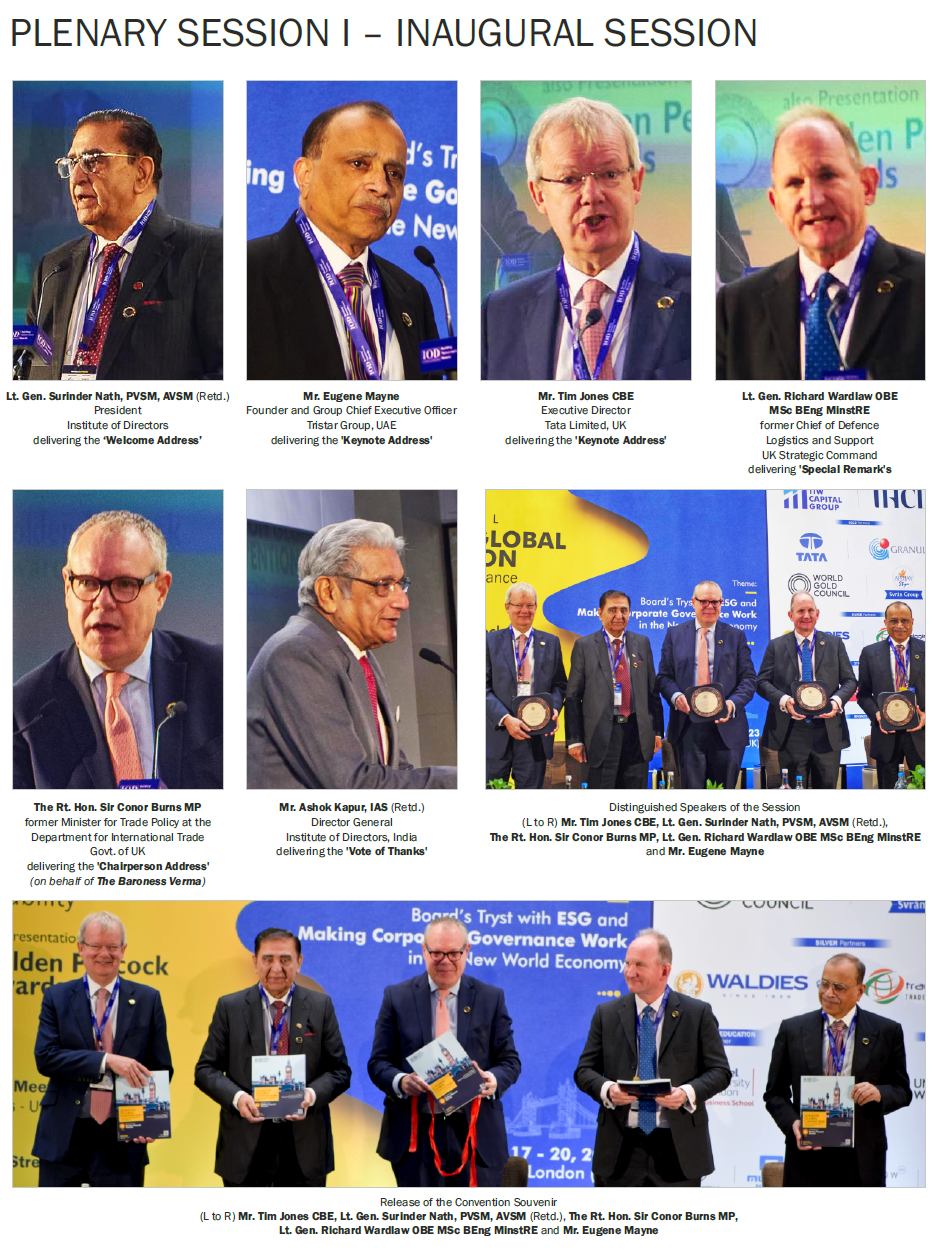
The 'Keynote Address' was delivered by:
(1) Mr. Eugene Mayne
Founder and Group Chief Executive, Tristar Group, UAE
(2) Mr. Tim Jones CBE
Executive Director, TATA Limited, UK
Mr. Mayne spoke about Sustainability and what it should mean to organisations; and also emphasised on the concept of 'ESG'. He further said that ESG is here to stay, and soon, boardrooms will have to actively take this up. He added, “There is always something we can do today to get a little better, to move a little closer, and to put ourselves and our organisations in better positions for tomorrow”. He continued, “What we need is Commitment: the authority, the resources, and expertise to drive initiatives; what we need is Unity: more dialogue, greater participation, and a higher level of engagement; as the world gets polarized, it is pockets of unity and mutually beneficial partnerships that will help us save the planet.” He mentioned the upcoming COP 28 and outlined its key themes. He concluded by saying, “If we are part of the problem, we must be a part of the solution too”.
Mr. Jones said that the world is at a difficult stop. He outlined the work of the Tata Group on the environment. He said, “Wealth generated from the company is recycled into good work in India'. He added that society is not a stakeholder in business but is the purpose of business. He announced that Tata Group has the ambition of reaching net zero by 2045. He highlighted the challenge for Indian businesses, where they have to grow in a carbon-friendly way, a task that has never happened before. He discussed Sustainable Aviation Fuels (SAFs) and mentioned Tata's efforts to reduce carbon emissions in the aviation industry. He concluded by saying that the Tata group is actively committed to playing their part in creating a sustainable world.
The 'Special Remarks' were delivered by:
Lt. Gen. Richard Wardlaw OBE MSc BEng MInstRE
former Chief of Defence Logistics and Support Strategic Command, UK
Lt. Gen. Wardlaw spoke on the role of boards in driving sustainable supply chains. He informed that in the defence sector, climate change is considered to be an existential threat. He described the defence business as one of deterrence, sustaining operations, and warfighting. Wars are a test of logistics, and, our ability to out-sustain is fundamental to winning. He urged the gathering to ditch the idea of pursuing cost and quality in our supply for the last two decades, and at least rebalance it in favour of resilience. He listed the three most important priorities for boards, which are:
(1) Redesign your supply chain, which starts with data and understanding.
(2) Rethink your relationship with your industry or supply chain, making it more partnership-based instead of transactional, so that both parties win.
(3) Make Green Technology a Key Enabler of Greater Self-Sufficiency.
He advised boards to invest in sustainable supply chains and build a new normal.
The 'Chairman Address' was delivered by:
The Rt. Hon. Sir Conor Burns MP
Former Minister for Trade Policy Department for International Trade, Government of UK
Sir Conor said that Brexit was a good starting point for the UK to expand its commercial and economic ties with other non-European countries. As one of the largest democracies and a rising power in world affairs, India and the UK are bound by similar democratic traditions, the English language, educational system, and legal framework. Rather than dwelling on the past, however, they should look forward to a modern, dynamic, economic, political, and cultural partnership. He reiterated the principle of Indian Prime Minister, Mr. Narendra Modi, "One Earth, One Family, and One Future," laid down at the recent G20 Summit. He further said that corporations are not just economic entities; they are engines of socio-economic transformation and sustainable growth, and discussed how consumers expect modern businesses to not just create products but to 'create worth', and to be responsible for the world in which they operate. The strategy of integrating governance in environmental and social contexts leads to the creation of social value. He concluded by saying, “It is by individual effort that we create wealth to look after our planet and fellow citizens”.
Mr. Ashok Kapur, IAS (Retd.), Director General, Institute of Directors proposed the ‘Vote of Thanks’. He thanked all the special guests and speakers, especially Mr. Eugene Mayne, Mr. Tim Jones CBE, Lt. Gen. Richard Wardlaw OBE MSc BEng MInstRE and The Rt. Hon. Sir Conor Burns MP for gracing the event.
This was followed by the release of the Convention Souvenir.
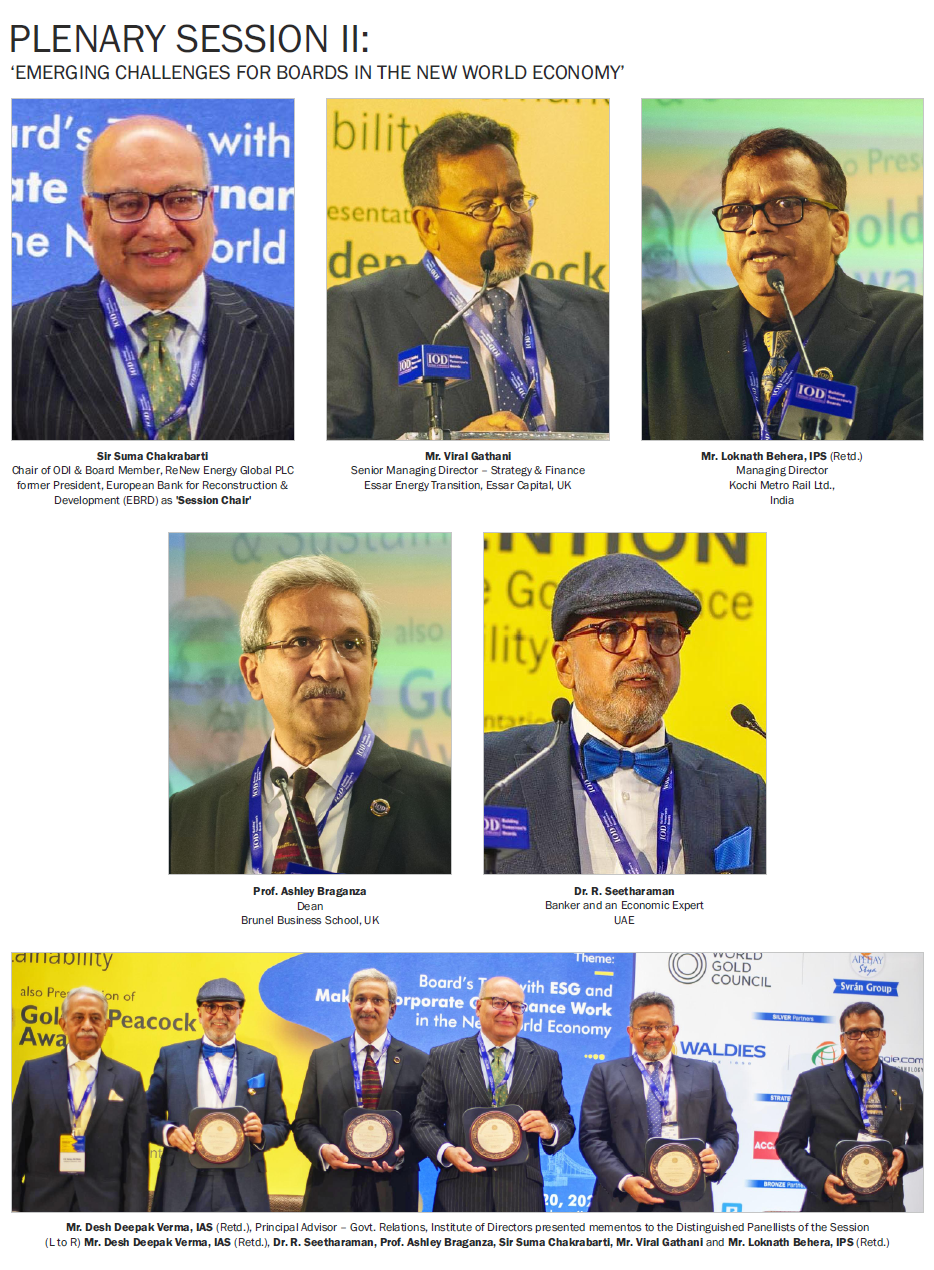
PLENARY SESSION II: Emerging Challenges for Boards in the New World Economy
The Session was Chaired by:
Sir Suma Chakrabarti
Chair of ODI & Board Member, ReNew Energy Global PLC, former President, European Bank for Reconstruction & Development (EBRD)
The Session had the following distinguished speakers:
(1) Mr. Viral Gathani
Senior Managing Director – Strategy & Finance, Essar Energy Transition, Essar Capital, UK
(2) Mr. Loknath Behera, IPS (Retd.)
Managing Director - Kochi Metro Rail Ltd., India
(3) Prof. Ashley Braganza
Dean - Brunel Business School, UK
(4) Dr. R. Seetharaman
Banker and an Economic Expert, UAE
Sir Chakrabarti eloquently discussed ESG and how it affects boards moving forward. He outlined the changing role of the Chief Executive Officers in organisations, from being responsible only for financial returns to now also caring for philanthropy, the environment, and the larger society. He discussed the reasons why ESG has moved from the margins to the mainstream and outlined the role TCFD plays in sustaining analytics in this transition. He cited various studies reflecting the positive impact of ESG on financial returns. He said, “New employees see ESG as part of their personal and professional missions”. He added that ESG has made it to management incentives, executive performance scorecards, and compensation. He explained the boardroom-specific governance framework for ESG and laid emphasis on the need to make efforts to support the poorer economies, improve their data quality, reporting, and transparency, and help them develop ESG-investable products.
Mr. Gathani compared the growth trajectory of present-day India with that of China 20 years ago. He highlighted the major differences between the two. He said that while China is ahead in terms of infrastructure, India is ahead in terms of entrepreneurial spirit, mainly driven by the private sector. He also mentioned that India is more internationally connected than China. He went on to discuss the real impact of decarbonisation on developed and developing economies. While explaining how decarbonisation will lead to challenges for a lot of the developed world, he said, 'I hope that the UK will be successful in managing these challenges because of its forward-looking and far-reaching decarbonising policy, particularly blue hydrogen.”
Mr. Behera said that the Water Metro in India has seen 1 million travellers in just about 4 months over two routes alone. He said that there is a strong need for leaders to prepare to accept the changing landscape of business with the advent of advanced AI. He also shared his views on ESG. With regards to boardrooms, he narrated a short story about Steve Jobs. In conclusion, he urged the audience to reconsider their governance style to accommodate the changing thoughts and outcomes.
Prof. Braganza discussed how to effectively achieve ESG through organisational change. In addition to establishing ESG goals and targets, he said, boards must also make these targets meaningful for their employees and shareholders and also ensure transparency throughout the organisation. He informed that it's easy for boards to get caught with sophisticated reports and compliances, and that it almost becomes an end in itself. He further explained that board committees on ESG are necessary but not sufficient to achieve ESG. For achieving ESG, boards need to think about the trade-offs and negotiations when adopting all targets of E, S, and G. Boards need to ensure that two divisions in an organisation do not pursue conflicting ESG targets and that risks in the supply chain are not simply moved from one part to another. He suggested boards foster 'Unity in Purpose'. He said, “Creating 'communities of purpose' that cut across functional silos is critical to success”.
Dr. Seetharaman discussed the necessity of reinventing business in light of shifting social norms. “'Unless you are a good person, you don't create a good society; unless there is a good society, you don't create good corporations; unless there are good corporations, you don't create good nations; unless there are good nations, you don't create good United Nations”, he said. ESG is not just an option; the solution is to restructure our business models. Global governance and corporate governance are interrelated. He added that in the post-COVID world, we are not location-centric; we are information-centric; we are not product-centric; we are consumer-centric.
This was followed by an interactive Q&A Session with the audience.
PLENARY SESSION III – Corporate Governance in the World Economy: The Changing Role of Directors
The Session was Chaired by:
Sir Andrew Likierman
Professor of Management Practice & Former Dean, London Business School, UK
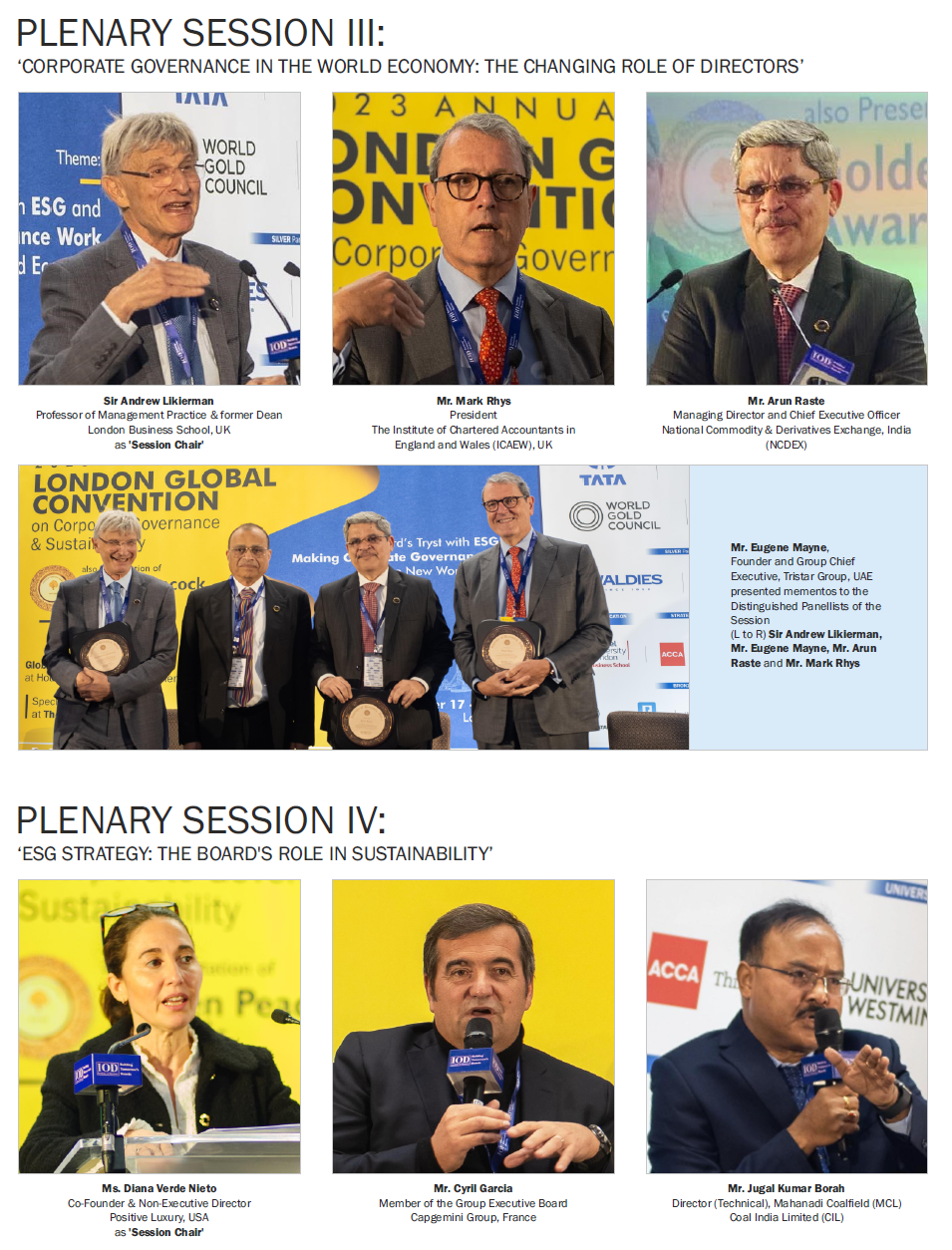
The Session had the following distinguished speakers:
(1) Mr. Mark Rhys
President - The Institute of Chartered Accountants in England and Wales (ICAEW), UK
(2) Mr. Arun Raste
Managing Director and Chief Executive Officer National Commodity & Derivatives Exchange, India (NCDEX)
Sir Likierman spoke about ESG and the strategy for adopting it in the boardroom. He noted that there is a gap between theory and practice when it comes to ESG. He suggested three questions to ask on the board: ESG: Why are we doing it? How does ESG connect with our stakeholders? And what do we actually do? He further shared his views on diversity on boards. He said that age diversity alone is not sufficient, but the individual behaviour of directors needs to be diverse.
Mr. Rhys spoke about the role of accounting in successful risk management in business. Building an organisation for longterm success requires decision-makers to engage with a far broader number of stakeholders than ever before. He outlined the increasing significance of accounting in this changing world. He observed that businesses are identifying and managing risks outside their control, which in the past few years has become ever more challenging. He further said that risk management is not about levels of results; it's about whether the right risks are identified in advance and managed. He concluded by saying that accounting will prove to be even more important in this volatile and unpredictable times where leadership and trust are highly valued.
Mr. Raste spoke about building future boards. He listed four basic skills that every board must have, covering expertise in IT, Chartered Accountancy, legal skills, and Operational skills. He also said that future boards will have more members from the age group of 30–40. He discussed the importance of diversity, both in terms of age and gender. He further spoke about stakeholder engagement, which is now not just limited to shareholders but also communities and advocacy groups. He concluded by urging existing directors to open up boards to the younger generation and to also provide them the opportunity to serve on boards to drive organisations forward.
This was followed by an interactive Q&A Session with the audience.
PLENARY SESSION IV: ESG Strategy: The Board's Role in Sustainability
The Session was Chaired by:
Ms. Diana Verde Nieto
Co-Founder & Non-Executive Director Positive Luxury, USA
The Session had the following distinguished speakers:
(1) Mr. Cyril Garcia
Member of the Group Executive Board Capgemini Group, France
(2) Mr. Jugal Kumar Borah
Director (Technical), Mahanadi Coalfield (MCL) Coal India Limited (CIL)
Ms. Nieto shared her views on a variety of topics, including diversity, Gen Z, and especially climate change. She explained the emerging trend of 'Conscious Consumerism', and also discussed reporting trends in both climate and governance. On the issue of climate change, she highlighted the importance of water and said that “water is the new gold”. She said, “It's not enough to have targets; you need to create transitional plans and have accountability in the board of directors and the executive teams”. She urged the audience to 'reimagine the future' and explore how their businesses can form part of the solution.
Mr. Garcia explained said that we need to reinvent another type of consumerism. He added that the marketing content of all businesses should be consistent with their overall strategy. As a few tips for boards to consider, he said, First, the executive leaders and teams should be empowered to bring about transition. Second, CSOs are vital on boards, as they play a major role in ensuring that all policies are also geared towards Sustainability. Third, governance is a 360º topic, and all disciplines need to be involved in the decision-making process. And fourth, boards need to review their organisational strategy more often. He also spoke about tying the compensation and incentives package of executives with Sustainability goals.
Mr. Borah outlined the various initiatives of Coal India towards Sustainability and social development. During the discussion, he shared three practical tips for boards to embrace. First, boards must be diverse, especially in terms of subject expertise. Second, boards should strive for transparency by conducting honest and voluntary disclosures. Third, boards should ensure the active engagement of Independent Directors for their optimum contribution. On the topic of 'shadow boards', he said that capable and young senior general managers are spotted and trained to be able to serve on the company boards in the future, which can also be part of their succession plans.
This was followed by an Interactive Q&A Session with the audience.
PLENARY SESSION V: Board dynamics and enhancing efficiency of various Board Committees
The Session was Chaired by:
Mr. Mohit Ralhan
Global CEO & Managing Partner TIW Capital, Singapore
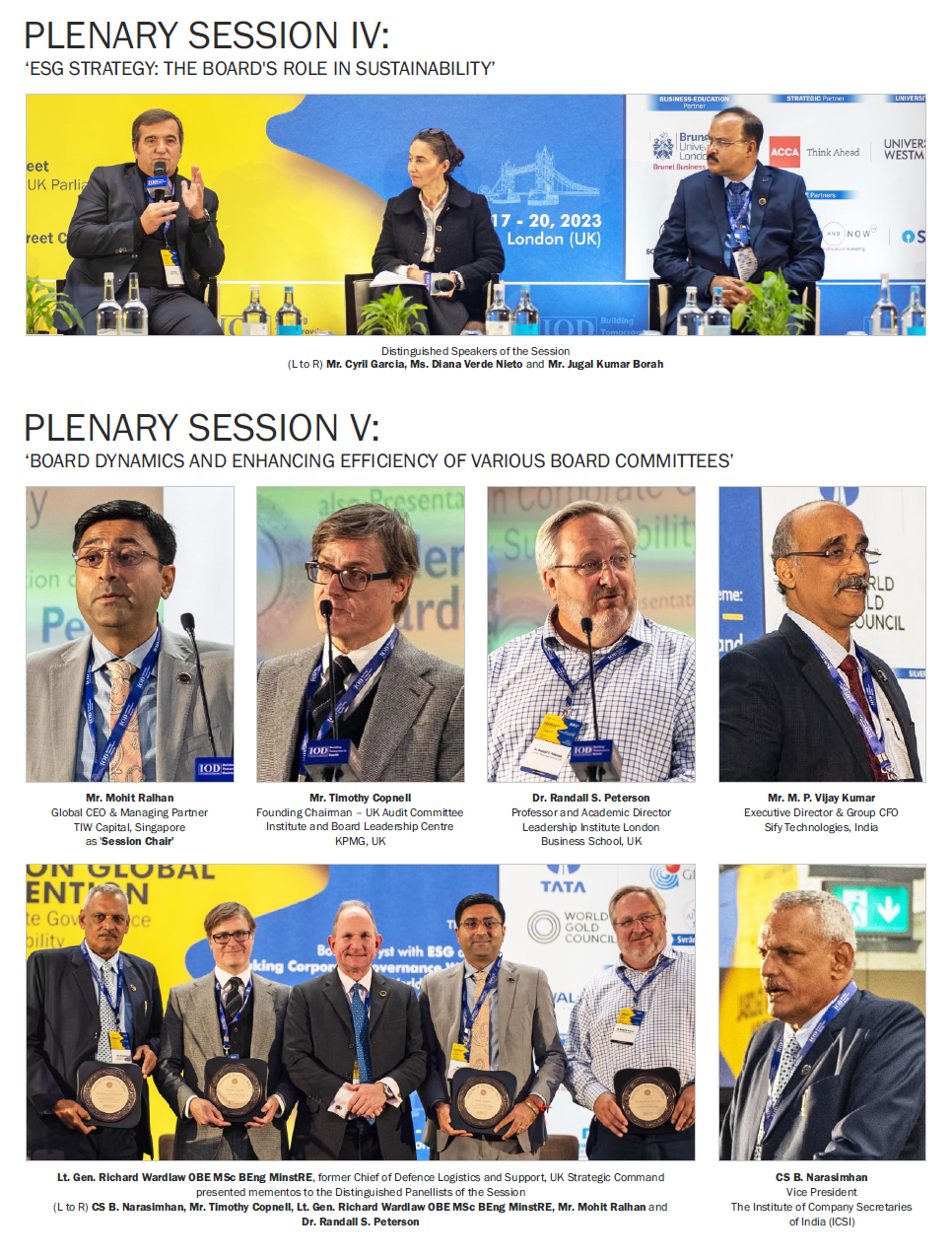
The Session had the following distinguished speakers:
(1) Mr. Timothy Copnell
Founding Chairman – UK Audit Committee Institute and Board Leadership Centre, KPMG UK
(2) Dr. Randall S. Peterson
Professor and Academic Director Leadership Institute, London Business School, UK
(3) Mr. M. P. Vijay Kumar
Executive Director & Group CFO Sify Technologies, India
(4) CS B. Narasimhan
Vice President - The Institute of Company Secretaries of India (ICSI)
Mr. Ralhan spoke about the changing world order in light of the global economy and its implications for boards. He highlighted the paradox in global policymaking: on one side, we have fiscal excesses that are fuelling inflation; on the other, we have increased monetary tightening and higher interest rates. He further discussed how inflation leads to margin pressure, how fraud, errors, and short cuts often happen when companies have to deal with margin pressure, and how margin pressure has a direct implication on governance, the NRC, and the audit committees. He observed that ESG is seen as a common framework for all, with no distinction made in benchmarks for MSMEs, SMEs, mid-market capital companies, or large market capital companies.
Mr. Copnell spoke about the effectiveness of board committees in the light of adopting ESG. He said that overlap in roles on the board is expected, but gaps in oversight should be avoided. He highlighted the need for boards and their committees to have access to all the right information. He discussed the need to have a 'clarity of purpose'. Board committees are simply tasked with assisting the boards and discharge their alotted duties. Board committees should not usurp the board's role and authority. It is incumbent on all board members to know what each committee is doing, what they have considered, and what their recommendations are. He said that ESG has become so important that boards need to transform from a passive style of governance to a more active style of governance.
Dr. Peterson spoke about culture in the boardroom. He said, 'Truth alone doesn't win; truth supported wins'. Rules are necessary, but not sufficient. If boards want to make progress in ESG, it is crucial to look at what boards are doing to embrace that culture. Boards need to prioritise culture in terms of who they include in the board. Board members need to ask questions about the culture in the boardroom. He said that according to his research, he found that 'learning culture outperforms performance culture every time'.
Mr. Kumar began with a caveat, 'one size does not fit all'. He said that the type of ownership of an organisation defines how the board will function, how the board is composed, and how its committees are constituted. He said that the ability to understand executive functioning is a very important capacity for a board member. He spoke about strengthening the position of IDs on boards. The best way to empower IDs is by making them Chair if they have the necessary skills for being entitled to a chair. He further suggested that the agenda of the board should be scheduled in such a manner that the summary of the recommendations of each of the committees should be presented by its chair during the board meeting. He also briefly touched upon digitalisation, and the importance of succession planning.
CS Narasimhan spoke about board secretarial practises in the context of a growing focus on ESG. He mentioned multiple initiatives by SEBI, including BRSR and the mandatory constitution of the Risk Management Committee (RMC). He spoke about physical risks, transition risks, and regulatory risks. He explained the purpose of board committees and the key factors of an effective board, i.e., Composition and Focus. He explained the role of IDs in the boardroom and also discussed the significance of having women directors. He announced that ICSI has created a charter for the Audit Committee and discussed how SEBI is optimistic about making the charter part of the Listing Obligations and Disclosure Requirements.
This was followed by an Interactive Q&A Session with the audience.
PLENARY SESSION VI: Building a Futuristic Board which Is Diverse, Tech-Savvy and understands Inclusion
The Session was Chaired by:
Mr. Manish Tiwari FRSA
Managing Director - Here and Now 365 Ltd., UK
The Session had the following distinguished speakers:
(1) Mr. J. K. Arora
Chairman & CEO - Tradologie.com, India
(2) Ms. Suja Chandrasekaran
Global Operations, Digital, Technology and Business Transformation Chief Executive and Board Member, USA
(3) Ms. Krystyna Jarek
Chief Innovation Officer - Deloitte Central Europe
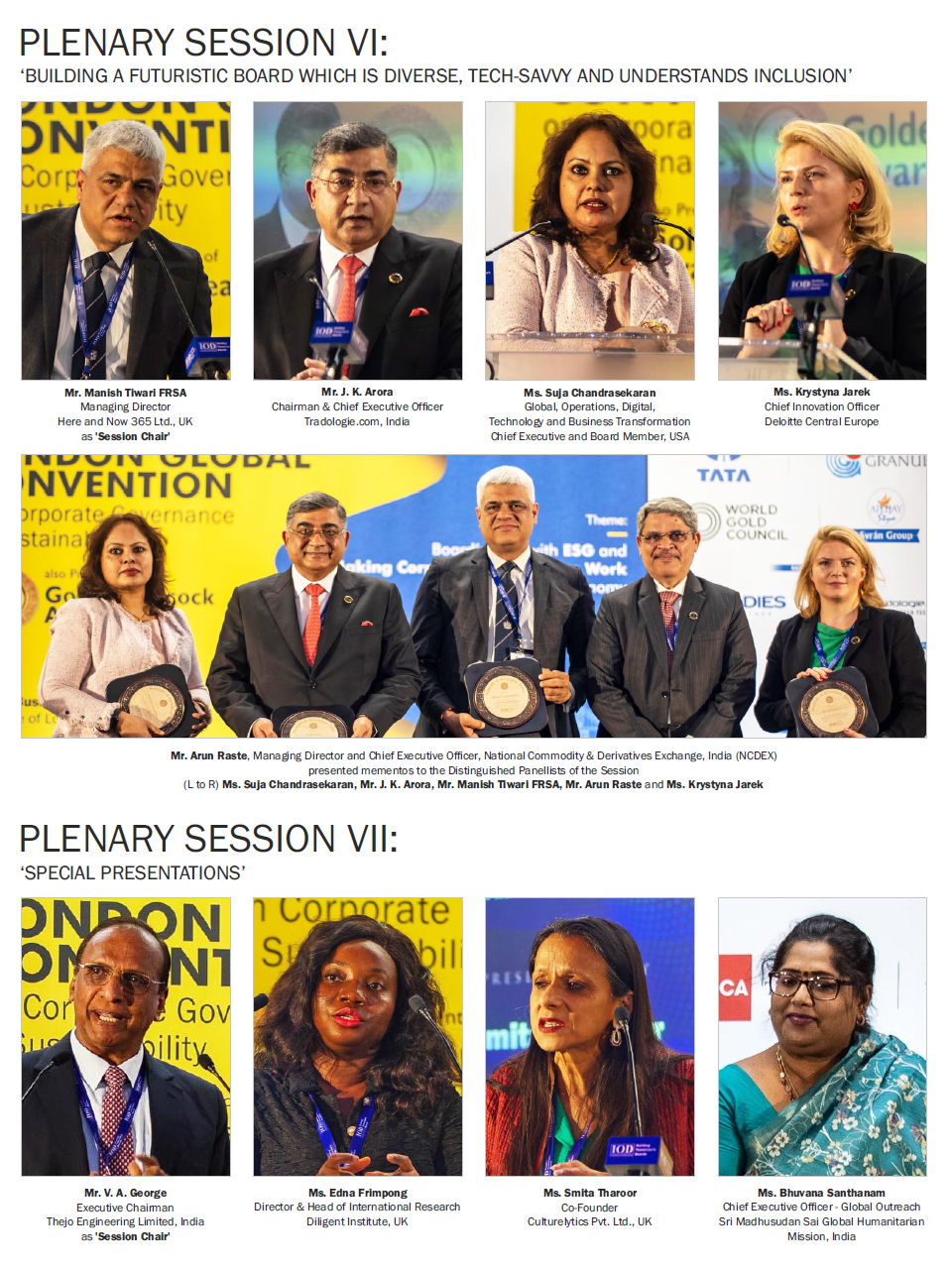
Mr. Tiwari provided the background and the context for the discussions by going over the session's theme, “Building a Futuristic Board." He talked about the need for diversity on boards and described how diversity in backgrounds, specialisations, and gender contribute to deeper boardroom conversations and improved strategy. He went on to say that when it comes to ESG, business leaders must be able to prioritise aiding the underprivileged and recognise their own privilege which they enjoy. According to him, inclusion means to understand those people who do not that privilege and try to include them also.
Mr. Arora spoke about ESG in the Indian business landscape. He said that India has around 1.6 million companies, but only 4500 are listed companies, and only 50 are actively traded. In this context, he said that ESG is a state of mind and that these small private companies need to become more self-reliant and independent before thinking of ESG. He said that there is a need to re-define governance. Each business has a different challenge, i.e., a manufacturing company, a service-provider company, or a trading company, all of which need to have a different ESG agenda. He said that regulation should be very broad-based. He highlighted that most companies are familyowned and promoter-led in India. He stressed the idea of spreading awareness about the need to adopt ESG. He said that transparency is key to a sustainable board.
Ms. Chandrasekaran eloquently describe the current Volatile, Uncertain, Complex and Ambiguous (VUCA) world and shed light on the various crucial topics being discussed in boardrooms today. She began by describing the unpredictable macroeconomic situation today. She said, “Leading through this multivariate world is very challenging for the executive leadership teams and boards today”. She said that boards are actively engaging in more and more strategic conversations. She quoted Mr. Jeff Bezos, who has said, “Your margin is my advantage." She spoke about the challenge of determining compensation for executive leaders in the context of such volatility in the macroeconomic situation today. She stressed the challenge of technology and AI. She also spoke about succession planning and the principle of 'return on investment.' She said, “Having a consistency of language among the executive team and between the executives and the boards is essential”.
Ms. Krystyna Jarek spoke about building boards for the next 5–10 years. She described three key words for the Theme: 'Future', 'Raw Imagination', and 'Creativity'. She said, “Somebody is thinking about how to disrupt your industry today by inventing a sustainable solution”. She asked, “How many times does your board discuss the future? Are you willing to kill your company for making it sustainable?” She further spoke about bringing a fresh perspective to what is going on, i.e., inventing a new way of managing the supply chain and analysing it in a vertical or horizontal manner. She also spoke about innovating single-click ESG reports for companies and the importance of recording ESG data for companies.
This was followed by an Interactive Q&A Session with the audience.
PLENARY SESSION VII: Special Presentations
The Session was Chaired by
Mr. V. A. George
Executive Chairman - Thejo Engineering Limited, India
Mr. George provided a brief outline of the session format and special presentations. He then introduced the speakers and invited them to speak. Towards the end of the session, he gave five tips for board effectiveness. First, the proper composition of the board solves 75% of the problems. Second, appoint a person who has good knowledge of compliance issues to minimise time spent on discussing only regulatory matters. Third, boards should spend 75% of their time on value-added discussions. Fourth, board members who speak the least during meetings should be encouraged to speak more often - they may be the ones with the best ideas. Last, the boards' role is to hold dialogue and discussions, and so data should be studied in advance, and minimum time should be spent listening to management presentations. Towards the end, he said, “In essence, boards are nothing but managing conflicts”.
This was followed by special presentations by:
(1) Ms. Edna Frimpong
Director & Head of International Research Diligent Institute, UK
(2) Ms. Smita Tharoor
Co-Founder - Culturelytics Pvt. Ltd., UK
(3) Ms. Bhuvana Santhanam
Chief Executive Officer - Global Outreach Sri Madhusudan Sai Global Humanitarian Mission, India
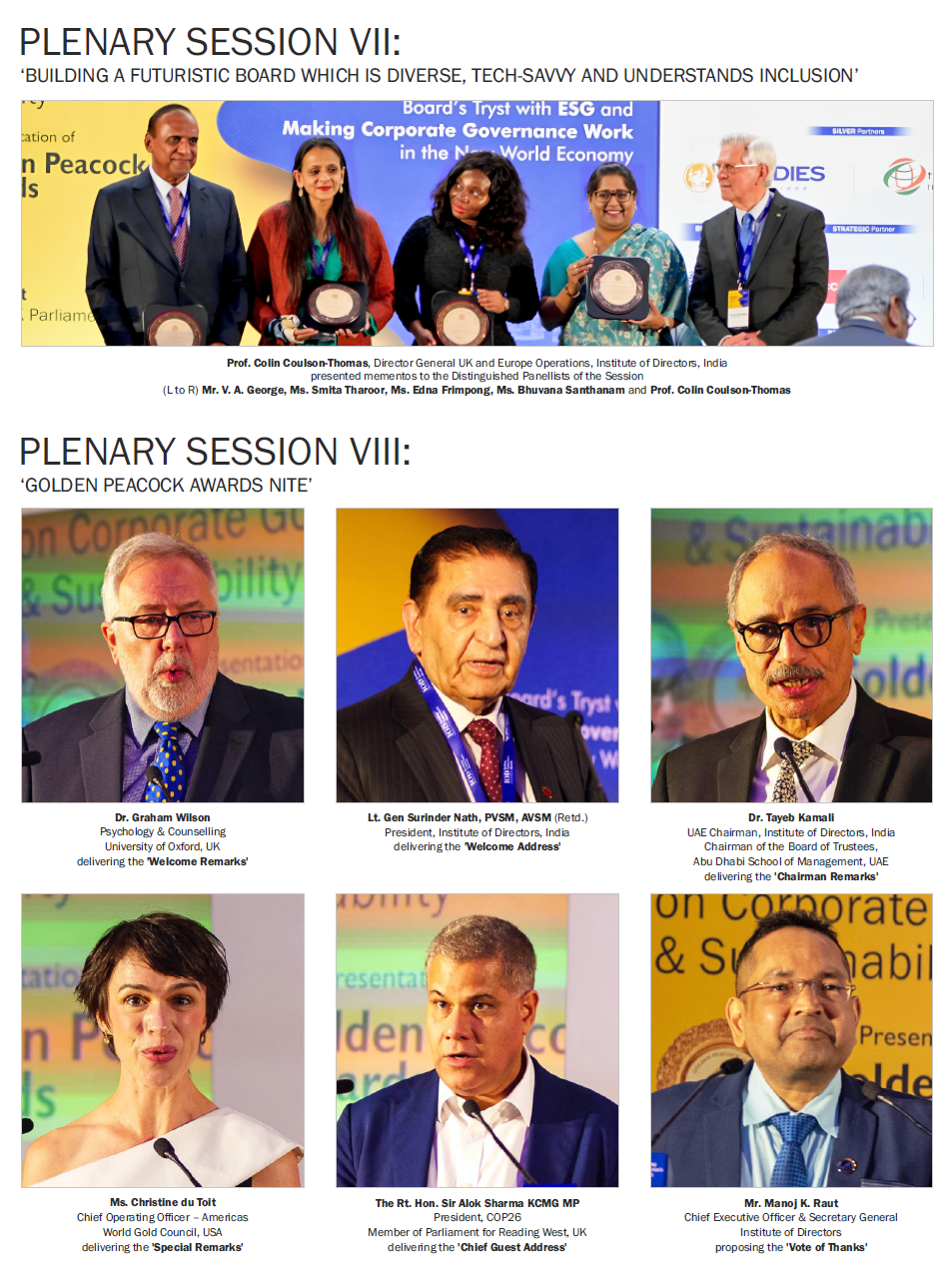
Ms. Frimpong spoke on the theme, “Strategies, Challenges, and Evolving Trends Around ESG in the Boardrooms: A Joint Survey Report by Diligent Institute and IOD India”. She gave a brief background on the survey initiatives and then explained a few key findings of the report. According to their report, India is well positioned in important fundamentals of ESG. 52% of the respondents in India said that they view EGS as an opportunity. The report also tried to find out what the major obstacles are to adopting ESG. Both in India and globally, the most common obstacle faced by businesses is a 'lack of clarity'. The survey also indicated that the boards as a whole seek to oversee ESG. Based on the findings of the report, she suggested that boards must undertake ESG training for better ESG policymaking. She also talked about the Diligent Climate Leadership Certificate Program.
Ms. Tharoor spoke on the theme, “Measuring Organisational Culture: Why It Matters to Boards”. She introduced Culturelytics and announced the 3-year research partnership between Culturelytics and IOD. She spoke about the report's findings and said that the research findings indicate a widespread consensus that overall culture is a critical success factor for organisations. She gave reference to another study conducted in 2021, which revealed that 82% of CEOs focus on culture as a key priority. She said, “Culture is fundamentally intertwined with how a company is run, and culture is closely related to governance roles and the concept of risk culture”. She provided that organisational culture will become a leading challenge and opportunity for companies of tomorrow. She concluded by saying, “Over a period of time, like ESG, organisational culture will evolve into a core and measurable element of good governance.”
Ms. Santhanam spoke about the 'S' aspect in ESG and also highlighted the need to work on the children of today for a sustainable future. She highlighted the work of the Madhusudan Sai Global Humanitarian Mission, India, in three segments: free education, free healthcare, and free nutrition. She quoted Mahatma Gandhi, “Tena, Tyaktena Bhunjitah” (give more, take less, and consume with a sense of sacrifice). Towards the end, she presented a short video outlining the initiatives of the Sri Madhusudan Sai Global Humanitarian Mission. She urged the audience to hold themselves responsible for each other; only then will we all be able to create an equitable society for the future generations. She concluded by saying, "Long-term value can be created through long-term social investment”.
This was followed by an interactive Q&A Session with the audience.
PLENARY SESSION VIII: GOLDEN PEACOCK AWARDS NITE
The Golden Peacock Awards night was anchored with an introduction by:
Dr. Graham Wilson
Psychology & Counselling University of Oxford, UK
Dr. Graham welcomed all guests to the Golden Peacock Awards Night. He thanked all supporters and partners for their overwhelming sponsorship to the London Global Programme, especially the Platinum partner - TIW Capital Group, Singapore; Gold Partners - Tata Limited, World Gold Council, and, Apeejay Stya Group, Granules India Limited, Essar Global Fund Limited; Bronze partners- Waldies Compound Limited, Tradologie.com; and all other strategic partners, associate partners and supporters. He introduced the IOD Golden Peacock Awards and said that the Awards not only help organisations with their brand building, but also have become a means of educating and developing the standards of other organisations.
The 'Welcome Address' was delivered by:
Lt. Gen. Surinder Nath, PVSM, AVSM (Retd.)
President - Institute of Directors, India
Lt. Gen. Nath spoke about the Golden Peacock Awards. He informed that the Golden Peacock Awards have grown from National to Global in 16 different corporate verticals. He announced that in light of the increasing focus on ESG, IOD has launched the Golden Peacock Awards on ESG. He further informed that the award assessment process is very transparent rigorous, and independent - A three stage exercise, handled by trained professionals. He congratulated all the Award winners for their efforts.
This was followed by the 'Chairman Remarks' delivered by:
Dr. Tayeb Kamali
UAE Chapter Chairman, Institute of Directors, India; Chairman of the Board of Trustees, Abu Dhabi School of Management, UAE
Dr. Kamali spoke about the famed Golden Peacock Awards and their objective. He reminded everyone of its actual meaning; he said, “The Golden Peacock Awards today are symbols of your hard-work, dedication and excellence”. With this, he extended a warm welcome to the grand special evening of inspiration and celebration.
This was followed by special remarks by:
Ms. Christine du Toit
Chief Operating Officer - Americas World Gold Council, USA
Ms. Toit congratulated all the awardees of the Golden Peacock Awards. She explained about the World Gold Council and said that they promote and sustain the demand for gold. She further said that the World Gold Council is happy to be a Gold Partner for the IODs London Global Annual Convention. She then thanked the organisers for hosting the convention.
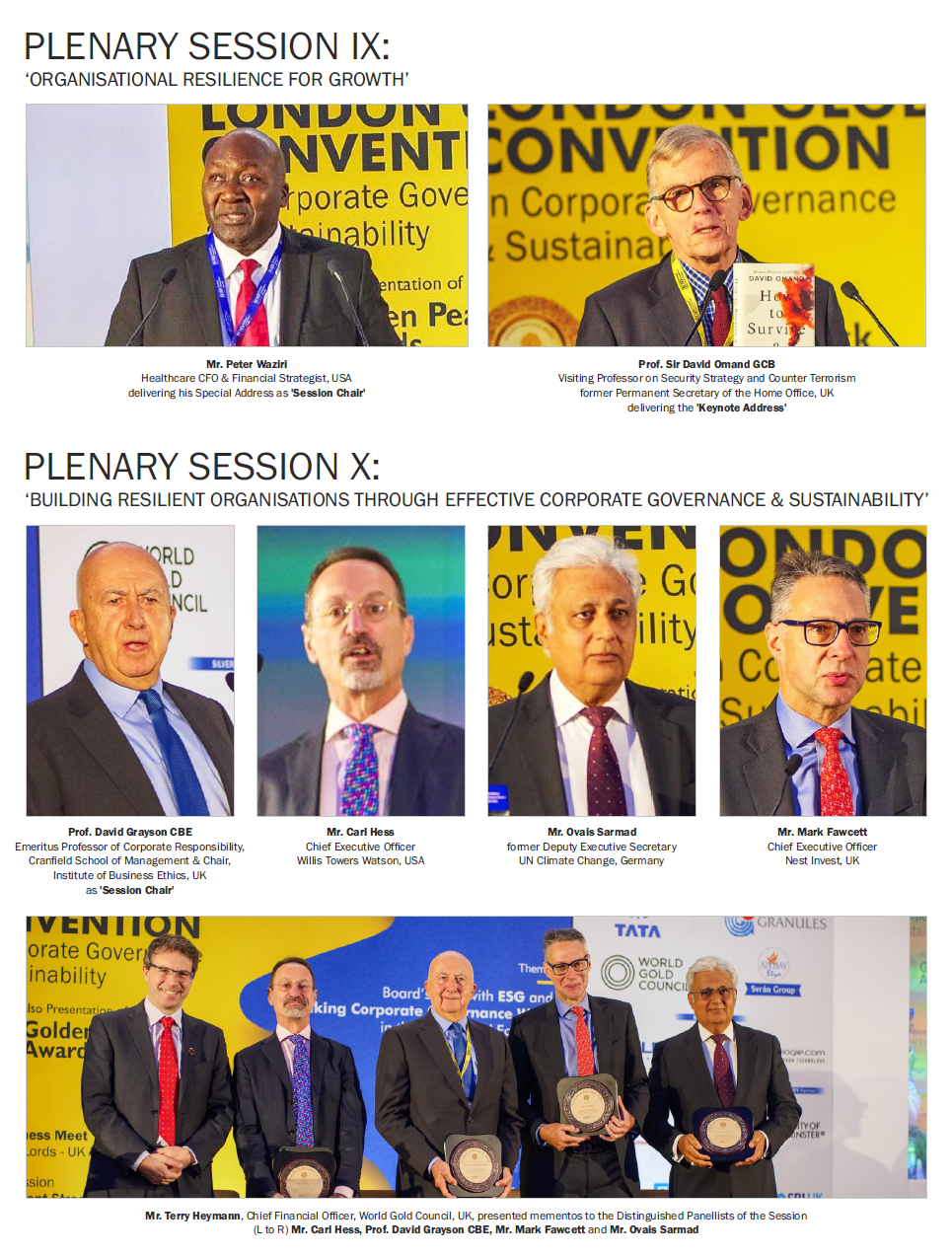
This was followed by the 'Chief Guest Address' by:
The Rt. Hon. Sir Alok Sharma KCMG MP
President of COP26 Member of Parliament, UK
Sir Alok Sharma outlined a brief summary of the global issue of climate change. He said that under the presidency of the UK, around 200 countries signed up with the COP 26. According to an estimate by the International Energy Agency, if one were to total all the commitments made at COP 26, we are heading towards an increase of 1.8 °C of global warming. He gave multiple examples of the real-life impacts of Climate Change on vulnerable communities across the world. He warned that the cost of unmitigated Climate Change would lead to a reduction of 20% of GDP every year. He added, “Climate change makes other risks even worse. To keep on the right path, we need to reduce 40% of emissions, and we also need to speed up the pace of renewables being rolled out across the world”. He further mentioned that the younger generation wants to work for organisations that prioritise the environment concern. Towards the end, he congratulated all the Award winners for their success. He said, “The Golden Peacock Awards continue to be an emblem of success”.
This was followed by the Presentation of the Golden Peacock Awards for Corporate Governance, ESG, Sustainability (Global & National) and Risk Management by The Rt. Hon. Sir Alok Sharma, Ms. Christine du Toit, Dr. Tayeb Kamali and Lt. Gen. Surinder Nath, PVSM, AVSM (Retd.).
All the winners were present at the ceremony and received the Awards in-person, by flying to London from various countries. The detailed List of all Award Winners is given elsewhere in this issue.
The 'Vote of Thanks' was proposed by:
Mr. Manoj K. Raut
CEO & Secretary-General Institute of Directors, India
Mr. Raut thanked all the speakers for participating and sharing their views. He said that this is a golden era of the historic relationship between India and the UK. He expressed gratitude to Rt. Hon. Sir Alok Sharma for sparing his valuable time and gracing the event. He further thanked all the distinguished speakers for sharing their thoughts.

PLENARY SESSION IX: Organisational Resilience for Growth
Success Stories on Effective Implementation of 'Risk Management’
Case Study Presentations
The Session was Chaired by:
Mr. Peter Waziri
Healthcare CFO & Financial Strategist, USA
Mr. Waziri spoke about geopolitical changes and the importance of risk management. He said, “The only thing that is constant is change, and change is happening more frequently; it is interconnected and is now more unpredictable than ever”. He shed light on cyberattacks and data breaches and spoke about 'technical death' and 'cyber warfare', while persuading the gathering to prepare for such risks. He said, “It is the unknown that could happen; that has never happened before”. With this, he invited all the presenters to the dais to share their views.
Case Studies in the 'Risk Management' category were shared respectively by the below-mentioned companies:
1. Tata Capital Limited, India
2. The Indian Hotels Company Limited, India
3. Edelweiss Tokio Life Insurance Company Limited, India
4. REC Limited, India
Each presentation was followed by an interactive Q&A Session with the audience.
The 'Keynote Address' was delivered by:
Prof. Sir David Omand, GCB
Visiting Professor on Security Strategy and Counter-Terrorism & former Permanent Secretary of the Home Office, UK
Prof. Sir David Omand GCB, spoke in depth about risk management and made suggestions for effective risk management. He said that there are two most definite risks ahead of us: first, technology, i.e., generative AI and quantum bioengineering; and second, climate change, with more frequent heat waves, famines, droughts, desertification, migration, etc. He explained 'self-imposed risks', 'slow burn crises, and the importance of information resilience. He suggested two initiatives for leaders: first, mobilise the organisation in a time of crisis, and second, ensure that warnings of impending or looming crises travel upwards to the csuit. He concluded by quoting from his book, "Not every unexpected disruption in our lives need become a crisis, provided that we have anticipated the possibility. And not every crisis need tip into failure and disaster, provided that we have previously invested sufficiently in personal, corporate and national resilience”.
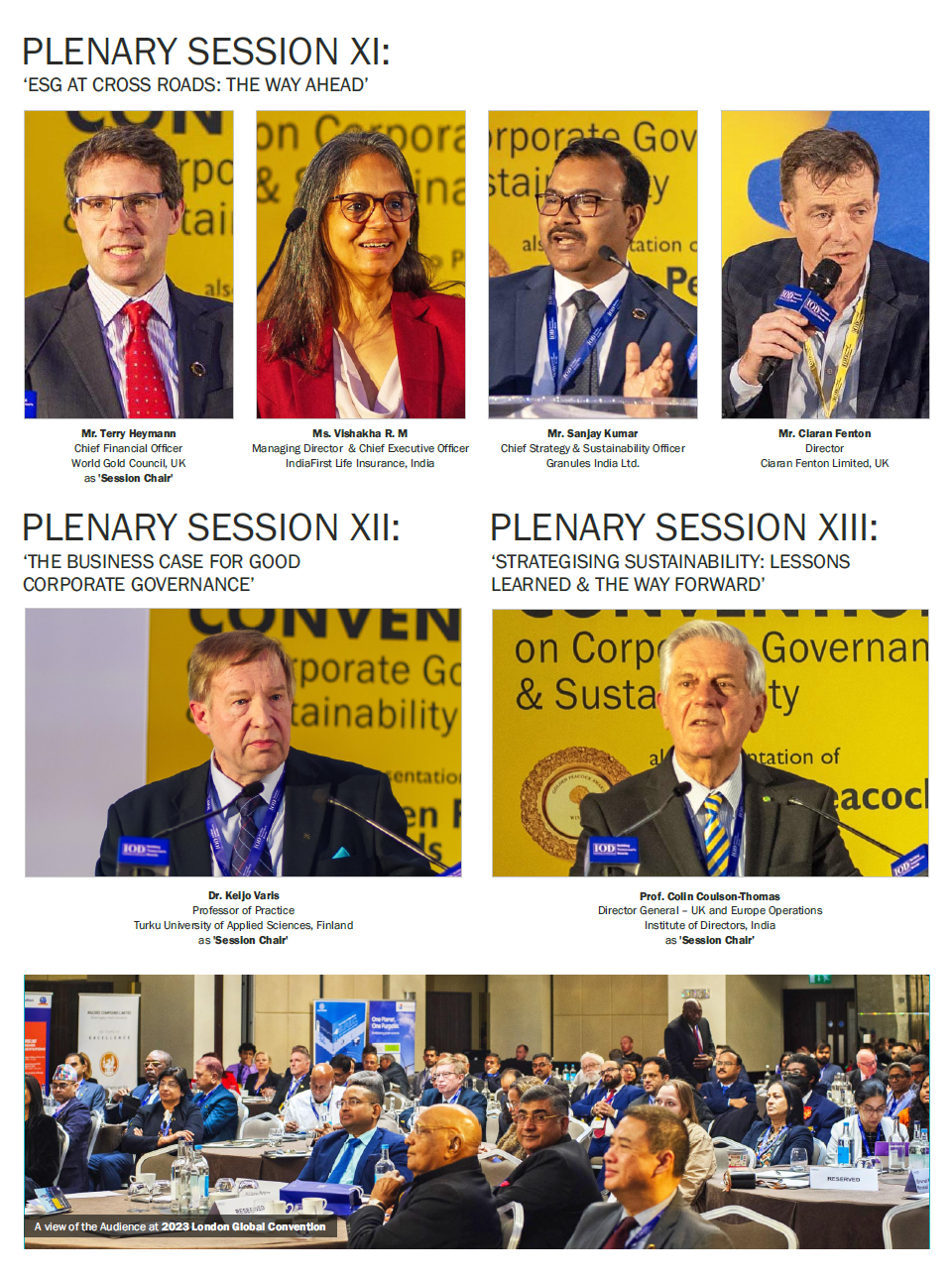
This was followed by an interactive Q&A Session with the audience.
PLENARY KEYNOTE SESSION X – Building Resilient Organisations through effective Corporate Governance & Sustainability
Success Stories on Effective Implementation of 'Sustainability’
Case Study Presentations
The Session was Chaired by:
Prof. David Grayson CBE
Emeritus Professor of Corporate Responsibility Cranfield School of Management & Chair, Institute of Business Ethics, UK
The Session had the following distinguished speakers:
(1) Mr. Carl Hess
Chief Executive Officer - Willis Towers Watson, USA
(2) Mr. Ovais Sarmad
Former Deputy Executive Secretary UN Climate Change, Germany
(3) Mr. Mark Fawcett
Chief Executive Officer - Nest Invest, UK
Prof. Grayson CBE spoke about the governance aspect of ESG. He said that the real challenge lies in identifying how boards should lead their organisations to reduce the risks of those unethical behaviour becoming a threat to the future of the organisations. He also spoke about all the potential risks arising from unethical cultures in organisations. He further announced the 'IBE guidance for board members on developing an ethical business culture' and encouraged all boards to refer to it.
Mr. Hess spoke in-depth about corporate stewardship and its key principles. Instead of the 3Ps, he expanded and introduced the 5Ps, i.e., People, Planet, Purpose, Performance, and Protection. He said that effective risk management should result in higher and more sustainable business over the long term. He proposed a new stewardship model based on the belief that companies must maintain long-term sustainable value and become responsible citizens of the global economy. In his research, he observed that there is a strong connection between company performance and key human capital metrics. In conclusion, he said, “Global stewardship supports the essence of capitalism, with leadership actions focused on both long-term and short-term viability, stability, and financial performance. Protection and performance are essential components to add to purpose, planet, and people for organisations to thrive both today and tomorrow.”
Mr. Sarmad spoke about the immense opportunities corporations have while managing the risks of climate change. He highlighted that the cost of renewables has dramatically been slashed over the years and is cheaper than fossil fuels today. He said that moving to an environmentally protected integrity solution is no longer a choice but a necessity. COP 28 will be an extremely important opportunity for all. His message to the audience was, “Keep an eye on the impacts of climate change and what is happening in the trajectory of global warming, and adapt your business to it”.
Mr. Fawcett outlined the various sustainable initiatives that Nest Invest is taking. He said, “Judiciousness, integrity, and impact are the guiding principles of Nest”. He explained that the executive team is responsible for setting the tone at the top. He spoke about 'sustainable capitalism' and said that “if you don't consider all stakeholders, you are not sustainable”. He said that executive remuneration has been distorted by conflicting parties because running an established company comes with significantly lower risk than being a fresh entrepreneur. In conclusion, he said that if companies do not work together, share knowledge, and invest in each other, we are not going to reach goal of net-zero.
This was followed by an interactive Q&A Session with the audience.
PLENARY KEYNOTE SESSION XI – ESG at cross roads: The way ahead
The Session was Chaired by:
Mr. Terry Heymann
Chief Financial Officer - World Gold Council, UK
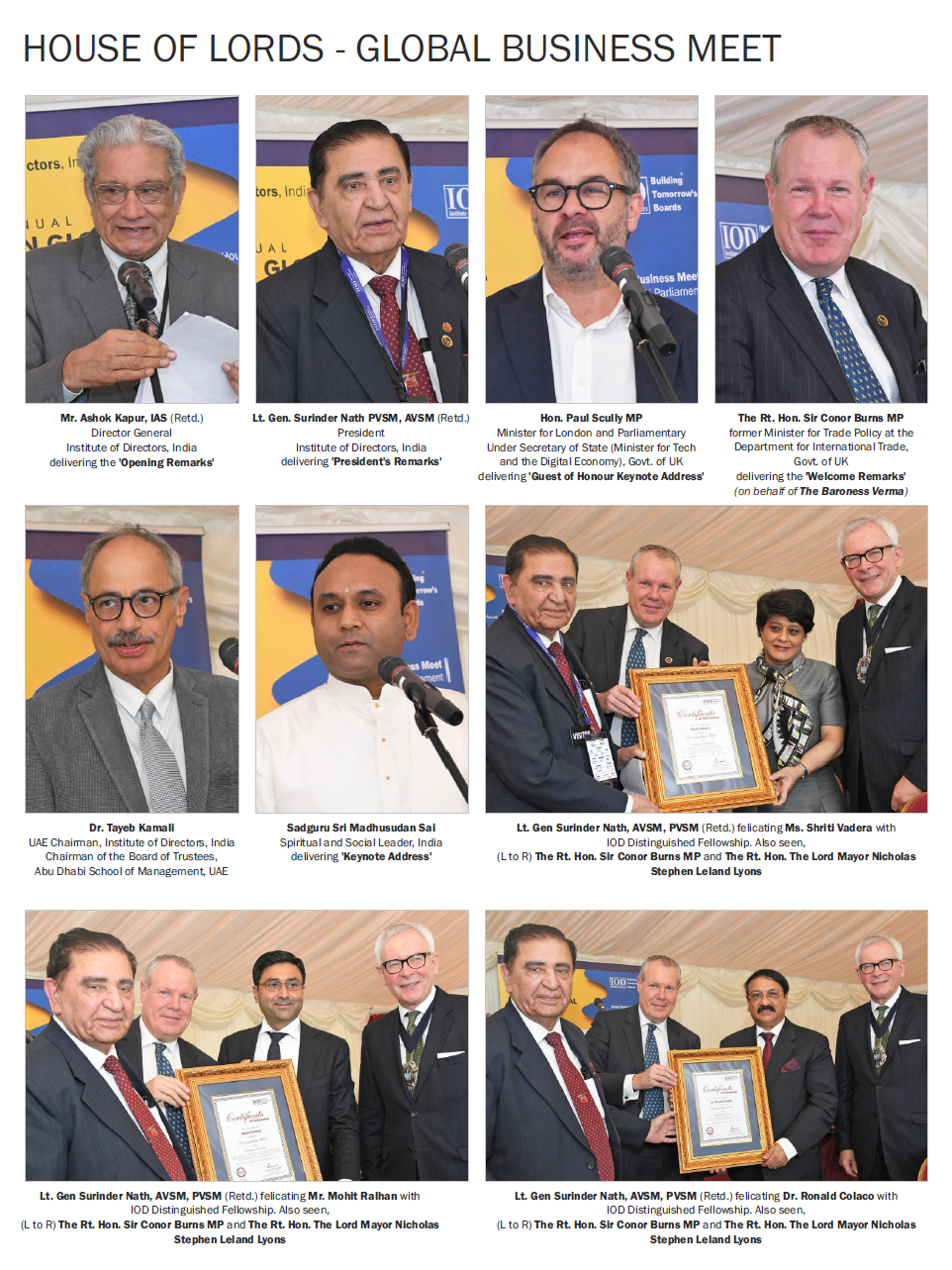
The Session had the following distinguished speakers:
(1) Ciaron Fenton
Director - Ciaran Fenton Limited, UK
(2) Ms. Vishakha R. M
Managing Director & Chief Executive Officer IndiaFirst Life Insurance, India
(3) Mr. Sanjay Kumar
Chief Strategy & Sustainability Officer Granules India Ltd.
Mr. Heymann spoke about the role played by gold in ensuring and supporting efforts toward socio-economic development. He said that gold is a global commodity and plays a critical role in supporting financial security and, through that, ESG. He mentioned a film created by the World Gold Council that shows the impacts of responsible gold mining.
Mr. Fenton shared his views on a number of themes under the broad umbrella of Sustainability. He said that the best approach to embracing diversity is: “How can we value diversity?” On the idea of climate change, he observed that 'Chief Sustainability Officer' (CSO) is the fastest-growing job; however, most CSO's have to struggle with influencing the board. He further said that if sustainability and ESG were financially rewarding, they would have been adopted years ago. His message to the audience was to step back and look at their personal objectives. On the idea of ESG training, he explained that years ago, directors had to only worry about P&L, but suddenly, they also have to now care about ESG, which is where he highlighted that there is hardly any training that directors take for actualising such a transformation. He concluded by saying, “You might make less profit compared to last year, but you would enjoy more peace”.
Ms. Vishakha spoke about the diversity element of the S in ESG. She emphasised women's diversity in particular and explained how women add value to the workplace. She said that while the gender ratio in Higher Education is 50:50, only 26% of women are able to take on managerial roles. The reason for the decrease in women's participation is because of, first, microaggression in the workplace against women; second, higher rates of burnout as they have to handle work and the bulk of the housework; and third, gender stereotypes. She said that corporations fail to recognise women's service in raising children and put their careers as second priorities. She firmly said that the lack of gender diversity in boardrooms is a huge risk for organisations. She further highlighted that most present-day board members have themselves not experienced gender diversity in the workplace and urged that a major behavioural and mind-set transformation is urgently required.
Mr. Kumar spoke about the E in ESG. He particularly laid emphasis on climate change. He said that the mindless pursuit by all shareholders would destroy the planet. We are truly on the path to self-destruction. He said that putting a price tag on carbon is the right way to do it. He highlighted the leading role that India is playing in global trade and manufacturing.
This was followed by an interactive Q&A Session with the audience.
PLENARY KEYNOTE SESSION XII – The Business Case for Good Corporate Governance
Success Stories on Effective Implementation of 'Corporate Governance'
Case Study Presentations
The Session was Chaired by:
Dr. Keijo Varis
Professor of Practice Turku University of Applied Sciences, Finland
Dr. Varis spoke about Sustainability. To him, Sustainability means to be successful always, where companies grow and prosper. He compared India with an elephant, and said that we are all like parrots, whispering into the ears of the elephant. He also introduced the book, “Transforming Nokia”.
Respective Individual case studies in 'Corporate Governance' category were shared by the below-mentioned companies:
1. Evalueserve Holdings AG, Switzerland
2. Sona BLW Precision Forgings Limited, India
3. Birla Corporation Limited, India
4. Dr. Reddy's Laboratories Limited, India
Each presentation was followed by an interactive Q&A Session with the audience.
PLENARY KEYNOTE SESSION XIII – Strategising Sustainability: Lessons learned & the way forward
Case Studies on 'Sustainability' & 'ESG’
Success Stories on Effective Implementation of 'Sustainability' and 'ESG’
Case Study Presentations
The Session was Chaired by:
Prof. Colin Coulson-Thomas
Director-General- UK and Europe Operations Institute of Directors, India
Prof. Colin outlined the current environmental scenario, and explained the worsening climate impact, especially on vulnerable communities. He spoke about the rising sea levels, the global temperature rise, and how India is one of the leading emitters of greenhouse gases. He said, “Directors and boards should act in the best long-term interests of companies, investors and other stakeholders; Global risks, challenges and existential threats create myriad opportunities to transition, transform, reimagine, and innovate”. He concluded by saying that people look at boards to initiate the development of solutions as well as address problems.
Respective Individual case studies in the 'Sustainability' category were shared by the below-mentioned companies:
1. Amara Raja Batteries Limited, India
2. Allianz Technology SE, India
3. Bangalore International Airport Limited, India
4. The Dun & Bradstreet Corporation, USA
Respective Individual case studies in the 'ESG' category were shared by the below-mentioned companies:
1. Western Digital Corporation, USA
2. Tristar Group, UAE
3. IDFC FIRST Bank Limited, India
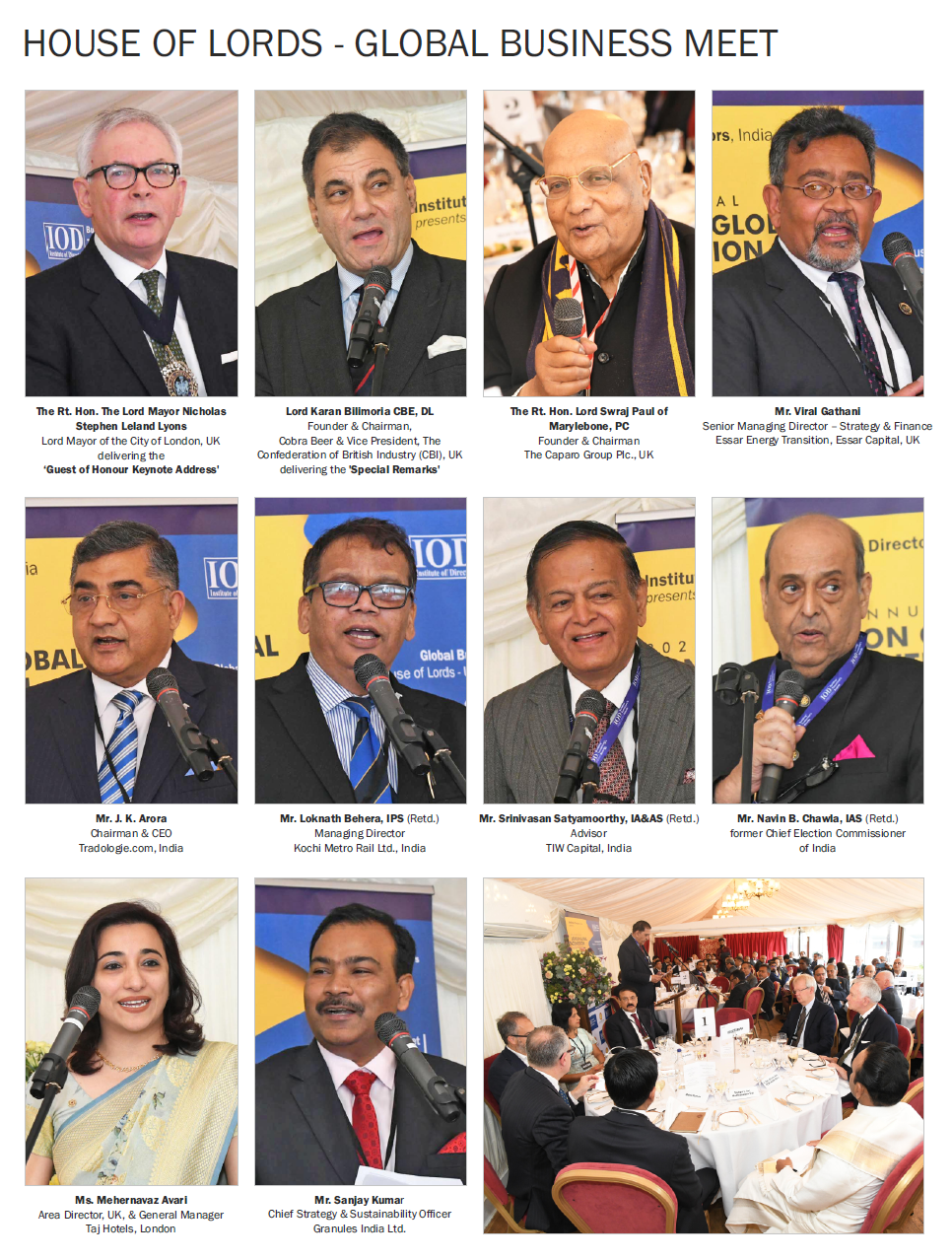
Each presentation was followed by an interactive Q&A Session with the audience.

OPENING SESSION: Global Luncheon Business Meet
The 'Opening Remarks' were proposed by Mr. Ashok Kapur, IAS (Retd.), Director General, Institute of Directors, India. He welcomed all the Distinguished Guests and Excellencies to be part of the IOD Global Business Meet. He said that the FTA between UK & India is just round the corner, which will be a game changer for two of the largest ten economies in the world today. He explained that Risk is inherent in volatility - reputational, economic and operational risks have emerged as our top concerns for corporates around the globe. He thanked the Indian business & industry leaders who especially flew to the UK, and eminent members of local India diaspora. He also thanked all the generous supporters & partners of the Global Business Meet 2023.
The 'President's Remarks' were delivered by Lt. Gen. Surinder Nath, PVSM, AVSM (Retd.) President, Institute of Directors, India. Lt. Gen. Nath welcomed all guests. He said that UK has played an important role in India's growing global trade. India & the UK have a lot in common. “We share almost 300 years of close association. We are close partners in the Commonwealth of Nations, former colonies but now equal partners for mutual benefit.” He further said that IOD, India has taken a unique initiative of holding the Business Meet annually, along with 'London Global Convention' which have proved to be a very positive step in strengthening Indo-British Business relations & trade.
The 'Chief Guest Address' was delivered by:
(1) Hon. Paul Scully MP
Minister for London and Parliamentary Under Secretary of State (Minister for Tech and the Digital Economy) Government of UK
(2) The Rt. Hon. Sir Conor Burns MP
Former Minister for Trade Policy at the Department for International Trade, Government of UK
Hon. Paul Scully expressed his appreciation for the exclusive venue of the Global Business Meet. He shed light on the shared history and culture of India and the UK. He said that the global commitment to ESG has never been so involved. He was proud to say that while Bangalore, India, is the fastest-growing tech hub in the world, London is the second-fastest-growing tech hub.
Sir Conor Burns MP spoke about India-UK relations. He said that Brexit was a good starting point for the UK to create its own trade policy for the first time in five decades. He spoke about his role in the Free Trade Agreement between India and the UK. He shared that when India was assessed on relevant parameters such as size of market, complementarity the strengths of the UK , international offerings, and political willingness to engage in a conversation with the UK on strengthening, deepening, growing, and broadening trade, India came on the top on each parameter. He further explained more about the Free Trade Agreement.
The 'Special Remarks' were delivered by:
Dr. Tayeb Kamali
UAE Chairman, Institute of Directors, India; Chairman of the Board of Trustees, Abu Dhabi School of Management, UAE
Dr. Kamali emphasised on the transformational change brought in by artificial intelligence. He said, “AI has started to dominate all business conversations everywhere”. He also shed light on the importance of diversity in operating businesses. He took the opportunity to invite all distinguished guests in the House of Lords to the IODs UAE Global Convention, 2024.
The 'Keynote Address' was delivered by:
Sadguru Sri Madhusudan Sai
Spiritual and Social Leader, India
His Holiness Sadguru Sri Sai spoke about how philanthropy and charity are embedded in Indian culture. He emphasised the 'Tripartite Model' i.e., 'Sarkar, Samaj, and Sanstha' (Government, Society, and Organisations). He spoke about the origins of the G20 theme adopted by India. He outlined the various initiatives taken by Sri Madhusudan Sai Global Humanitarian Mission, India, including healthcare and first-generation literacy. He further spoke about the significance of forming partnerships for social development. He said, “A large part of India is still on the other side, and somebody has to go over and help them cross the bridge. He added, “It is the responsibility of the educated persons to ensure the education of others." He also spoke about the Indian government's commitment to social development by mandating Corporate Social Responsibility in Law. He requested the gathering of business leaders to find business opportunities in rural and backward communities. To conclude, he quoted Mahatma Gandhi: “The difference between what we do and what we are capable of doing would suffice to solve most of the world's problems”.
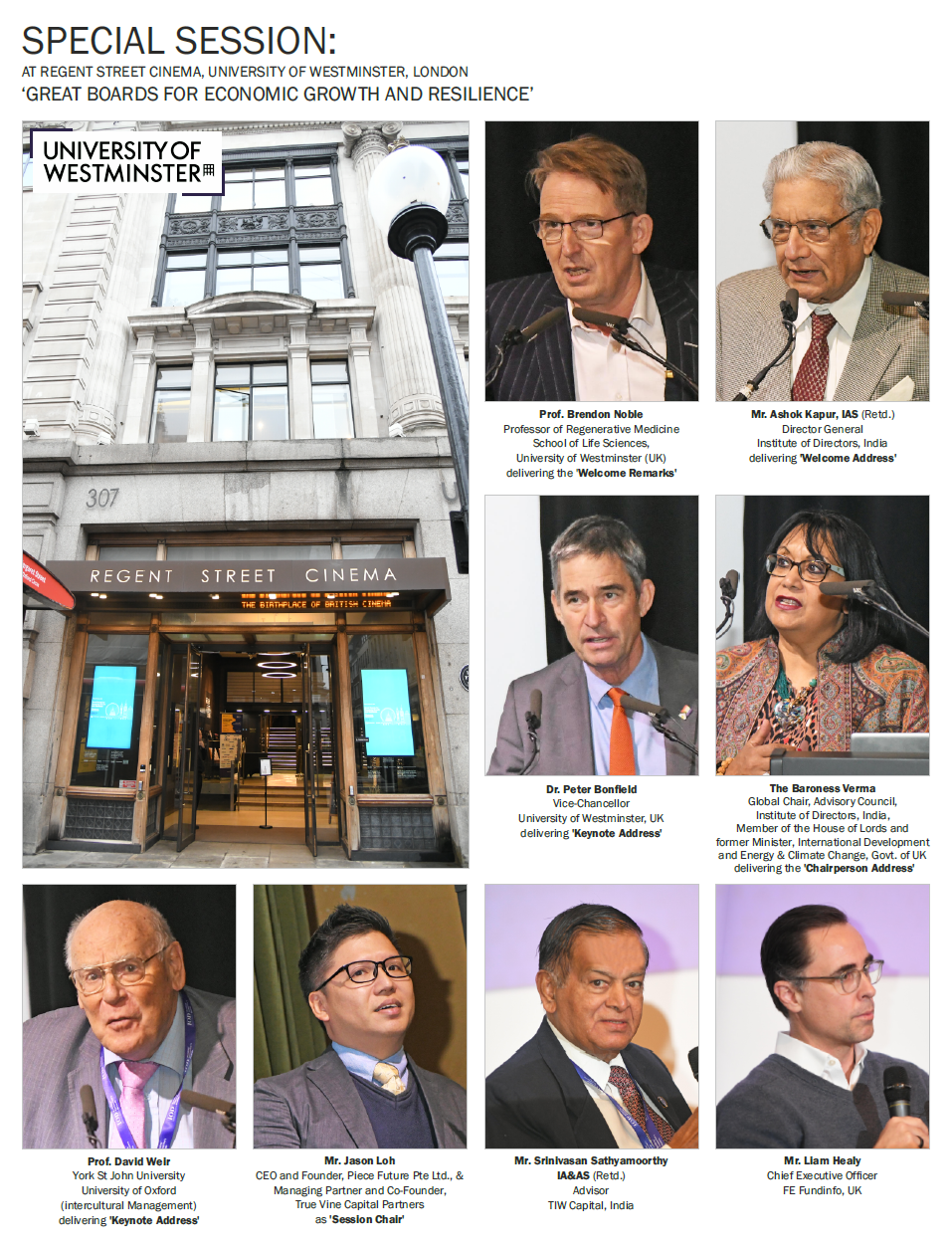
IOD conferred the Distinguished Fellowships 2023 on notable leaders and visionaries who also graced the event. These leaders include:
(1) Ms. Shriti Vadera
Chair Prudential plc & The Royal Shakespeare Company Co-Chair, World Bank Private Investment Lab, UK
(2) Mr. Mohit Ralhan
Global CEO & Managing Partner TIW Capital, Singapore
(3) Dr. Ronald Colaco
Founder Chairman - Clarks Exotica, India
Ms. Vadera gracefully accepted the Award and said that it was appreciated because she got her heritage, education, and values from India. She was honoured to receive the Award. She said, “It is interesting to be given a fellowship and be recognised for the 'rigour of good decision making', whether it is in the realm of public policy or private business”.
Mr. Ralhan said that it was his honour for him to receive the IOD Distinguished Fellowship Award. He thanked his family, friends, teachers, colleagues, and, especially, his wife. He narrated a series of interesting anecdotes from his life that helped him get where he is today. He further shared his belief in the promising future of the relationship between India and the UK. He concludes by saying, “The journey has just begun”.
Dr. Colaco humbly accepted the IOD Distinguished Fellowship Award in recognition of his long-term social, charitable, and humanitarian services. He appreciated the efforts of IOD, India, in organising such a grand meeting. He shared his views on the importance of diversity and all kinds of pluralism that India has enjoyed for so long. While outlining his efforts to support creating communal harmony in India, he requested that all others also work towards creating harmony in diversity. He expressed that if diversity is not celebrated peacefully, society will not be conducive to overall economic growth. In conclusion, he said, “There is no second chance for you and me to come back to this world; whatever you can do for society is either now or never”
The 'Guest of Honour Address' was delivered by:
The Rt. Hon. The Lord Mayor Nicholas Stephen Leland Lyons
Lord Mayor of the City of London, UK
The Rt. Hon. The Lord Mayor started by thanking Baroness Verma, H.E. Vikram Doraiswamy, and Lt. Gen. Surinder Nath for inviting him and hosting the IOD Global Business Meet. He elaborated on the strong partnership between India and the UK. He spoke about how the UK is the home to 1.5 million Indians, how the UK is the 6th largest investor in India, and more. He said that the UK's relationship with India has been a top priority for the City of London Corporation, which is working to make it easier for Indian and UK firms to do business with each other. He appreciated the role of the Indian government towards Sustainability and said that Mr. Modi's commitment to net-zero by 2070 shows realistic ambitions. He said that London is the Green Capital of the world and has a history of pioneering sustainable finance. He concluded by saying, “We must redouble our efforts to explore ways that the UK and India can contribute to deepening our partnership”.
The 'Special Remarks' were delivered by:
(1) Lord Karan Bilimoria CBE, DL
Founder & Chairman, Cobra Beer & Vice President The Confederation of British Industry (CBI), UK
(2) The Rt. Hon. Lord Swraj Paul of Marylebone, PC
Founder & Chairman - The Caparo Group Plc. UK
(3) Mr. Viral Gathani
Senior Managing Director – Strategy & Finance Essar Energy, Transition, Essar Capital, UK
(4) Mr. J. K. Arora
Chairman & CE - Tradologie.com, India
(5) Mr. Loknath Behera. IPS (Retd.)
Managing Director - Kochi Metro Rail Ltd., India
(6) Mr. Srinivasan Sathyamoorthy, IA&AS (Retd.)
Advisor - TIW Capital, India
(7) Mr. Navin B. Chawla, IAS (Retd.)
Former Chief Election Commissioner of India
(8) Ms. Mehrnavaz Avari
Area Director, UK, & General Manager Taj Hotels, London
(9) Mr. Sanjay Kumar
Chief Strategy & Sustainability Officer Granules India Ltd.
Lord Karan Bilimoria CBE, DL appreciated the way India hosted the G20. He said, “The way India hosted the G20 was in a different league compared with any other country ever to have hosted it.” He said that the G20 2023 had 112 outcomes, which is double of what the next highest country has ever achieved. He further went on to discuss the strong UK-India relationship and shared his views on the upcoming Free Trade Agreement between India and the UK.
The Rt. Hon. Lord Swraj Paul of Marylebone, PC gave a brief outline of his career trajectory and narrated the story of how the Institute of Directors was born way back in 1990. He particularly thanked Mr. Ashok Kapur, IAS (Retd.) Director General, Institute of Directors, and Mr. Manoj K. Raut, CEO and Secretary General, IOD, for their tremendous efforts in leading IOD to where it is today.
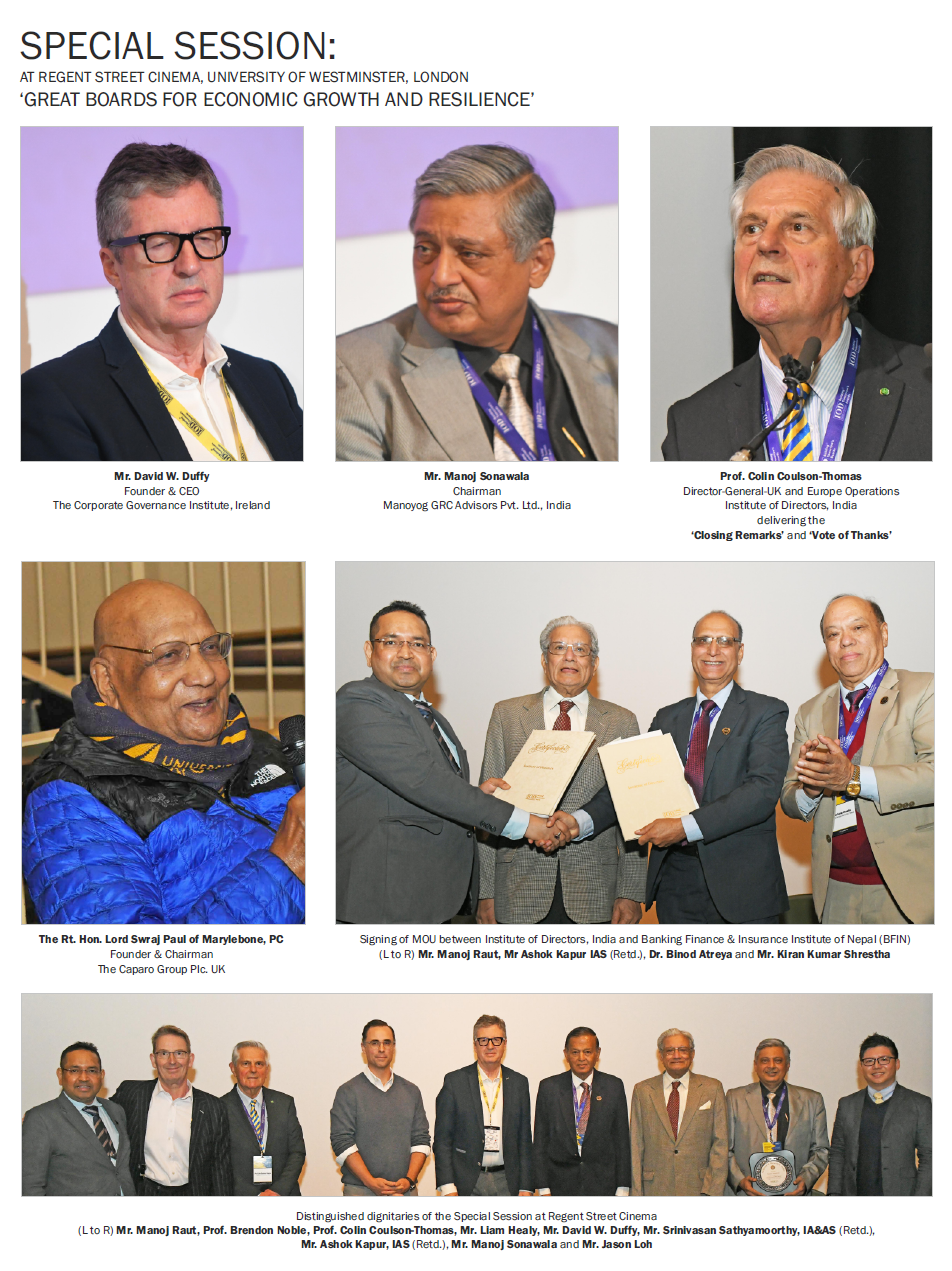
Mr. Gathani compared the growth trajectory of present-day India with that of China 20 years ago. He highlighted the major differences between the two. He said that while China is ahead in terms of infrastructure, India is ahead in terms of entrepreneurial spirit, mainly driven by the private sector. He also mentioned that India is more internationally connected than China. He outlined the achievements of Essar Global Fund Limited, working in the space of blue hydrogen, providing carbon energy solutions, and innovating in the sustainability arena.
Mr. J. K. Arora discussed the impacts of the burning issues of the changing geo-political scenario today. He further discussed the huge advantage India has today, i.e., population, and how the incredible human capital, including world-class engineers, doctors, and lawyers, can be used to nurture growth. He gave a few suggestions on how to further make use of the incredible relationship between the UK and India. He said that we need to shift from a "perception-driven market' to a 'fundamental-driven market'. He also shared his views on the Free Trade Agreement between India and the UK.
Mr. Loknath Behera, IPS (Retd.) explained how far India has progressed today, from building world-class malls to manufacturing luxury cars. He said that there is a strong need to adopt technology. He added that India continues to have a highly demarcated rural and urban system, defined by their varying levels of development. He too said that the high population in India is a huge advantage, making India a large market. He added that India should lead in the sphere of technology and AI.
Mr. Srinivasan Sathyamoorthy, IA&AS (Retd.) started by quoting Mr. Alvin Toffler, who said, “The rate of change will be faster than the days to come. He spoke about the 'Climate Revolution', and said that the sustainability of human beings is the greatest risk.” He ended by saying, “It is for each of us to reflect on the deliberations and make this world a better place to live in the future”.
Mr. Navin B. Chawla, IAS (Retd.) thanked IOD for inviting him to the House of Lords. He discussed a series of events during the 2009 General Election in India, when he was serving as the Chief Election Commissioner. He said that the next general elections in India will have 1 billion voters on the voting list. He added that India has 65% of the population participating in elections. He further talked about the charities that he is involved in, i.e., those relating to Mother Teresa and those relating to educating and caring for children suffering from leprosy in the spirit of CSR.
Ms. Avari represented her brand, i.e., the Indian Hotels Company Ltd., also known as the Taj Group. She said that her company has grown from being a 'brand of house' to a 'house of brands', as they have launched a variety of brands. She said, “Taj has alos been at the forefront of taking forward India-UK relations”.
Mr. Kumar shared his views on Climate Change. He quoted UN Secretary-General António Guterres, who said, “The period of global warming is over and is now shifting to global boiling”. He warned that, according to the World Economic Forum, 6 out of 10 global crises are related to climate change. He said, “Whatever is good for the society is good for us”. He elaborated on the various initiatives undertaken by Granules to embrace 'green chemistry' & sustainable 'pharmaceutical manufacturing'. He announced the partnership of Granules with GreenKo Zero Carbon to promote state-of-the-art integrated green pharmaceutical zones (GPZ). He quoted Peter Drucker, who said, “The greatest danger in times of turbulence is not turbulence itself, but the approaching such turbulence with the logic of the past”. He ended by saying, “Partnerships will go a long way in addressing the challenge of Climate Change”.

A special Session was organised at the Regent Street Cinema, the University of Westminster, London (UK) on the theme, 'Great Boards for Economic Growth and Resilience'. Several Westminster faculty and members from the Institute of Directors, India shared their thoughts and expertise on the role of boards in promoting economic growth and resilience.
The 'Opening Remarks' for the special Session were delivered by:
Prof. Brendon Noble
Professor of Regenerative Medicine, School of Life Sciences University of Westminster (UK)
Prof. Noble welcomed all distinguished guests and speakers to the special session. He opened the event with insights on the changing emphasis of the boardrooms in the context of Environmental, Social and Corporate Governance (ESG) and the importance of ensuring that boards have appropriate tools to navigate the disruption caused by emerging technologies. He set the context and background for the chosen theme, 'Great Boards for Economic Growth and Resilience' for the current dynamic economic climate.
This was followed by the 'Welcome Address' delivered by Mr. Ashok Kapur, IAS (Retd.), Director General, Institute of Directors, India. He thanked the University Vice Chancellor, Dr. Peter Bonfield, Prof. Brendon Noble and other faculty for hosting the IOD again this year.
The Session had the following ‘Keynote Speakers’:
(1) Dr. Peter Bonfield
Vice-Chancellor - University of Westminster, UK
(2) Prof. David Weir
York St John University University of Oxford (intercultural Management)
Dr. Bonfield welcomed the business participants from India as well as from the UK and other geographies who joined the special session. He shared his thoughts on the invaluable partnership between India and the University of Westminster. He also laid the foundation for the discussions of the day on the theme, 'Great Boards for Economic Growth and Resilience'.
Prof. Weir spoke on the topic of 'New Frameworks for Corporate Resilience and Sustainability'. He discussed how corporations could be more resilient, and highlighted the importance of being sustainable.
This was followed by ‘Special Remarks’ by:
The Rt. Hon. Lord Swraj Paul of Marylebone, PC
Founder & Chairman - The Caparo Group Plc. UK
The Rt. Hon. Lord Paul spoke about his association with the University of Westminster, having served in the University as the Chancellor from 2006 – 2014. He conveyed appreciation for the University of Westminster's collaboration and Memorandum of Understanding with the Institute of Directors.
This was followed by the 'Chairperson Address' delivered by:
The Baroness Verma
Global Chair, Advisory Council, Institute of Directors, India Chair, UN Women, UK and former Minister International Development and Energy & Climate Change, Govt. of UK.
Baroness Verma welcomed all the guests and thanked the Indian delegation. She emphasized the importance of trade and business between the two great democracies of the world today. She added that in this joint venture, the role of corporate boards is all-important, and these have to work in a very effective way.
This was followed by a Panel Discussion on the Special Session theme, 'Accelerating ESG Strategies through Innovative Technologies'
The Session was chaired by:
Mr. Jason Loh
CEO and Founder, Piece Future Pte Ltd., & Managing Partner and CoFounder, True Vine Capital Partners
The Speakers of the Panel Discussion included:
(1) Mr. Srinivasan Sathyamoorthy, IA&AS (Retd.)
Advisor - TIW Capital, India
(2) Mr. Liam Healy
Chief Executive Officer - FE Fundinfo, UK
(3) Mr. David W. Duffy
Founder & Chief Executive Officer - The Corporate Governance Institute, Ireland
(4) Mr. Manoj Sonawala
Chairman - Manoyog GRC Advisors Pvt. Ltd., India
Mr. Jason Loh introduced the theme of the session and set the context for the discussions that followed.
Mr. Sathyamoorthy spoke about the state of climate affairs in India. He outlined the depleting natural resources base of India and stressed the need to regenerate faunal wealth. He suggested that IOD could consider publishing a handbook for social exchange, directors and civil society leaders.
Mr. Healy discussed technology and its many challenges, such as privacy concerns, data breaches, and data violations. With regard to company directors, he discussed a risk-based approach, facilitating security and communication, involving technology.
Mr. Duffy spoke about the synergy between ESG and technology. He said that technology is the key enabler in online education for ESG. He highlighted the role of technology in ESG strategy and implementation. He also informed the audience, through his presentation, about the impact on business if boards did not embrace technology.
Mr. Manoj Sonawala spoke about the practical use of various kinds of technology in 'doing good' to society. He discussed leveraging the Internet of Things (IoT), gamification, data analytics, and blockchain technologies for business growth.
This was followed by the signing of the MoU between the Institute of Directors, India and Banking Finance & Insurance Institute of Nepal (BFIN).
The 'Closing Remarks' and the 'Vote of Thanks' were delivered by:
Prof. Colin Coulson-Thomas
Director-General- UK and Europe Operations Institute of Directors, India
On behalf of the Institute of Directors (IOD), India, Prof. Colin thanked the British Authorities who very kindly made available its premises at the 'House of Lords'. IOD also thanked the Hotel authorities of The Montcalm, Marble Arch, for the excellent arrangements, and the University of Westminster, especially the Vice-Chancellor, Dr. Peter Bonfield and Prof. Brendon Noble.
This was followed by a Working Lunch hosted by the University and Networking with the Alumni of the University of Westminster.
IOD is especially grateful to its Event Partners:
Its Platinum Partner: TIW Capital Group, Singapore
Its Hospitality Partner: Indian Hotels Company Limited
Its Gold Partners: (1) Tata Limited (2) World Gold Council (3) Apeejay Stya Group (4) Granules India Limited (5) Essar Global Fund Limited
Its Silver Partners: (1) Waldies Compound Limited (2) Tradologie.com
Its University Partner: University of Westminster
Its Business-Education Partner: (1) Brunel Business School, (2) Brunel University London
Its Knowledge Partners: (1) Culturelytics Private Limited (2) Diligent Institute
Its Strategic Partner: ACCA (Association of Chartered Certified Accountants), UK
Its Media Partner: Republic TV
Its Bronze Partners: (1) Sona Comstar (2) Muthoot Microfin Limited (3) State Bank of India (UK) Limited (4) Here and Now 365
Its Supporting Partners: (1) Banking, Finance and Insurance Institute of Nepal (2) The Institute of Cost Accountants of India, Lalcap Ltd. (3) London Chamber of Commerce & Industry
Its Associate Partner: The Institute of Company Secretaries of India (ICSI)
Author

Institute of Directors India
Bringing a Silent Revolution through the Boardroom
Institute of Directors (IOD) is an apex national association of Corporate Directors under the India's 'Societies Registration Act XXI of 1860'. Currently it is associated with over 31,000 senior executives from Govt, PSU and Private organizations of India and abroad.
Owned by: Institute of Directors, India
Disclaimer: The opinions expressed in the articles/ stories are the personal opinions of the author. IOD/ Editor is not responsible for the accuracy, completeness, suitability, or validity of any information in those articles. The information, facts or opinions expressed in the articles/ speeches do not reflect the views of IOD/ Editor and IOD/ Editor does not assume any responsibility or liability for the same.

 Quick Links
Quick Links
 Connect us
Connect us




 Back to Home
Back to Home






























